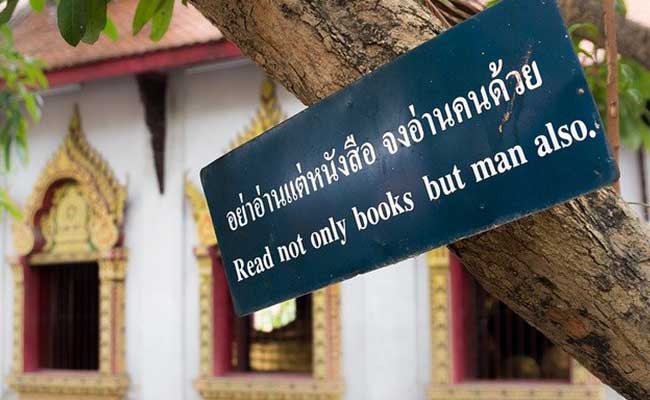Every language has its proverbs and sayings, often translations or variations of those found in other cultures. Proverbs, idioms and sayings are passed down through generations, much like folklore. They use metaphorical language to express a perceived truth based on generalizations or life experiences.
Oftentimes, a proverb offers a concise way to explain a situation that might otherwise require more complex language skills. It's also quite fun to look at the Thai equivalents to some of our most cherished English sayings.
Please note: The transliterations in this article may be somewhat imperfect. Translating Thai sounds into English can be challenging, but the Thai person you are speaking with will understand and assist you with pronunciation corrections.

12 Thai Proverbs & Their English Translations
1. When the cat's away, the mice will play
This is a common English saying, meaning that when a figure of authority (like a boss, teacher, or parent) is absent, people may take advantage of the situation by behaving more freely or breaking the rules.
When literally translated, the Thai version is a little different:
- แมวไม่อยู่หนูร่าเริง – meaw mai yoo noo ra reng
- Translation: The cat is away, the mouse is cheerful
2. Out of the frying pan into the fire
Again, a common English phrase that means going from a bad or difficult situation to an even worse one. It suggests that an attempt to escape a problem or danger may lead to a situation that's even more challenging or harmful than the original.
The Thai version uses a tiger and a crocodile to illustrate this:
- หนีเสื่อประจระเข้ – nee seua pa ja ra kay
- Translation: To escape from the tiger to the crocodile.
3. Like talking to a brick wall
If you're married, your wife has probably said this to you numerous times :). It's a classic, and means trying to communicate with someone who is unresponsive, unwilling to listen, or completely ignoring what is being said. It suggests a sense of frustration and futility in the conversation.
The Thais have a very unique way of saying this.
- สีซอให้ควายฟัง – see sor hai kwai fang
- Translation: To play the violin for the buffalo to listen to.
4. You can't have your cake and eat it
A favorite of mine, this proverb implies that one must make a choice between two conflicting desires or outcomes, that you can't enjoy two desirable but mutually exclusive things at the same time.
The Thai version of this is:
- จับปลาสองมือ – jab pla song meu
- Translation: Catch a fish with two hands.
I've heard this used to refer to a “playboy”: a man who has a wife but carries on with other women.
5. Every cloud has a silver lining
If you're from the UK like me, you certainly grew up with this one. It means that hardships or challenges often lead to better opportunities or outcomes, even though this may not be immediately apparent.
The Thai version of this is a little different in that it simply suggests everything balances itself out, the good and the bad.
- ชั่วเจ็ดทีดีเจ็ดหน – chua jed tee dee jed hon
- Translation: Bad seven times, good seven times.
6. Calling a spade a spade
This old-fashioned saying means to speak frankly, without sugarcoating or avoiding the truth, even if it may cause offense.
The Thai version is more poetic in nature:
- ขวานผ่าซาก – kwan par sark
- Translation: Splitting a hard wood with an axe.
Please note: Despite originally referring to a harmless gardening tool, it should be noted that in the mid-1920s, the word ‘spade' emerged in the USA as a reference to a Black person. Over time, this evolved into a derogatory term. As a result, some people now avoid using this proverb to prevent any confusion or unintentional offense.
7. A bad workman blames his tools
Something we've all been guilty of, especially those of use who are terrible at DIY. This proverb means that someone who has done something badly will seek to lay the blame on their equipment rather than admit their own lack of competence.
I really like the Thai version of this one, as it uses music to create the metaphor:
- รำไมดีโทษปี่โทษกลอง – rum mai dee tod pee tod glong
- Translation: Those who can’t dance blame it on the flute and the drum.
8. Make hay while the sun shines
My mum always used to say this to us kids as we were growing up. It means to make the most of a favorable situation while it lasts. If you have an opportunity to do something, do it before the opportunity disappears.
This reminds me of another of my favorite proverbs: “Don't put off until tomorrow what you can do today”.
The Thai version of ‘make hay while the sun shines is':
- น้ำขึ้นให้รีบตัก – nam keun hai reep dtak
- Translation: When the water rises, hurry to get some
9. A good deed is its own reward
This proverb suggests that the satisfaction and value of performing a good deed come from the act itself, rather than from any external recognition or reward.
The Thai equivalent:
- ปิดทองหลังพระ – pid tong lang pra
- Translation: Putting a gold leaf on the back of the Buddha image.
The act of putting gold leaves on a Buddha image is primarily to honor Buddha's teachings, though in Thailand it is also a form of making merit, which makes the proverb a tad inaccurate.
10. You can’t make an omelette without breaking any eggs
I'd actually never heard this proverb before but it applies when you have to go through something difficult for a good result, or to experience hardship to gain a desirable outcome.
The Thai version is nice and concise:
- ได้อย่างเสียอย่าง – dai yang sia yang
- Translation: You have to lose something to get another thing.
11. Prevention is better than cure
Commonly heard in the West, this quite obviously means that it's easier to stop something happening in the first place than to repair the damage after it has happened. This translates exactly the same in Thai:
- กันไว้ดีกว่าแก้ – Gan wy dtee gwaa gae
* Note that a similar saying in English, attributed to Benjamin Franklin, is: “An ounce of prevention is better than a pound of cure”.
12. Like mother, like daughter
This Thai proverb will come in handy for those with a Thai girlfriend/wife.
It suggests that daughters tend to do what their mothers did before them, and more generally that daughters resemble their mothers.
Please note that I am not responsible for any repercussions that happen as a result of you saying this to your partner.
The Thai version is actually more like the proverb “the apple doesn't fall far from the tree”, and makes good use of metaphor:
- ดูช้างให้ดูหางดูนางให้ดูแม่ – duu cháang hâi duu hăng duu naang hâi duu mâae
- Translation: When you look at an elephant, look at its tail. When you look at a girl, look at her mother.
—–
Got a Thai proverb to add to the list? Leave it in the comments section below.
More Tips for a Better Life in Thailand
Send Money to Thailand:
If you are sending money to your loved one, or your own Thai bank account, try Wise here. It is fast and cheap. Me and the majority of my readers are using it.
Get Good Health Insurance:
Start with a quick quote here from Cigna. Then you can compare it to other companies.
Improve Your Thai Skills:
Learning Thai makes life easier, and way more fun. I use Thaipod101. Get a free account by clicking here. It is really easy to use.
Last Updated on



Lana Scott says
Nov 01, 2022 at 11:43 am
TheThailandLife says
Nov 01, 2022 at 4:45 pm
Tim says
Nov 14, 2021 at 1:00 am
TheThailandLife says
Nov 15, 2021 at 5:26 am
555 says
Dec 02, 2021 at 1:54 am
charlie says
About Indians : If you see a cobra and an Indian walking down the road towards you, kill the Indian first.
Thai man's paradise : An American house, Japanese wife, Chinese food
Beauty standard : Burmese skin,Indian eyes
Humorous Thai saying in local bars re Beer : If my wife dies I wouldn't regret it as much as spilling oine drop of my beer
Apr 24, 2021 at 5:51 pm
TheThailandLife says
Apr 25, 2021 at 12:59 am